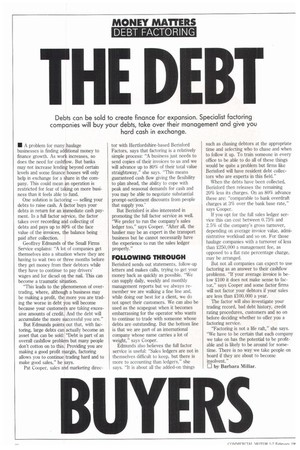TH E DE B T
Page 32

If you've noticed an error in this article please click here to report it so we can fix it.
Debts can be sold to create finance for expansion. Specialist factoring companies will buy your debts, take over their management and give you hard cash in exchange.
• A problem for many haulage businesses is finding additional money to finance growth. As work increases, so does the need for cashflow. But banks may not increase lending beyond certain levels and some finance houses will only help in exchange for a share in the company. This could mean an operation is restricted for fear of taking on more business than it feels able to fund.
One solution is factoring — selling your debts to raise cash. A factor buys your debts in return for an immediate cash payment. In a full factor service, the factor takes over recording and collecting of debts and pays up to 80% of the face value of the invoices, the balance being paid after collection.
Geoffrey Edmunds of the Small Firms Service explains: "A lot of companies get themselves into a situation where they are having to wait two or three months before they get money from their debtors while they have to continue to pay drivers' wages and for diesel on the nail. This can become a traumatic situation.
"This leads to the phenomenon of overtrading, where, although a business may be making a profit, the more you are trading the worse in debt you will become because your customers are taking excessive amounts of credit. And the debt will accumulate the more successful you are."
But Edmunds points out that, with factoring, large debts can actually become an asset that can be sold: "Debt is part of an overall cashflow problem but many people don't cotton on to this. Providing you are making a good profit margin, factoring allows you to continue trading hard and to make good sales," he says.
Pat Cooper, sales and marketing direc tor with Hertfordshire-based Berisford Factors, says that factoring is a relatively simple process: "A business just needs to send copies of their invoices to us and we will advance up to 80% of their total value straightaway," she says. "This means guaranteed cash flow giving the flexibility to plan ahead, the ability to cope with peak and seasonal demands for cash and you may be able to negotiate substantial prompt-settlement discounts from people that supply you.'
But Berisford is also interested in promoting the full factor service as well. "We prefer to run the company's sales ledger too," says Cooper. "After all, the haulier may be an expert in the transport business but he cannot necessarily have the experience to run the sales ledger properly."
FOLLOWING THROUGH
Berisford sends out statements, follow-up letters and makes calls, trying to get your money back as quickly as possible. "We can supply daily, weekly and monthly management reports but we always remember we are walking a fine line and, while doing our best for a client, we do not upset their customers. We can also be used as the scapegoat when it becomes embarrassing for the operator who wants to continue to trade with someone whose debts are outstanding. But the bottom line is that we are part of an international company whose name carries a lot of weight," says Cooper.
Edmunds also believes the full factor service is useful: "Sales ledgers are not in themselves difficult to keep, but there is more to accounting than ledgers," she says. "It is about all the added-on things such as chasing debtors at the appropriate time and selecting who to chase and when to follow it up. To train someone in every office to be able to do all of these things would be quite a problem but firms like Berisford will have resident debt collectors who are experts in this field."
When the debts have been collected, Berisford then releases the remaining 20% less its charges. On an 80% advance these are: "comparable to bank overdraft charges at 3% over the bank base rate," says Cooper.
If you opt for the full sales ledger service this can cost between 0.75% and 2.5% of the company's gross turnover, depending on average invoice value, administrative workload and so on. For those haulage companies with a turnover of less than 2250,000 a management fee, as opposed to a flat rate percentage charge, may be arranged.
But not all companies can expect to use factoring as an answer to their cashflow problems. "If your average invoice is below 2100 it does not make sense to factor," says Cooper and some factor firms will not factor your debtors if your sales are less than £100,000 a year.
The factor will also investigate your trading record, bad debt history, credit rating procedures, customers and so on before deciding whether to offer you a factoring service.
"Factoring is not a life raft," she says. "We have to be certain that each company we take on has the potential to be profitable and is likely to be around for sometime. There is no way we take people on board if they are about to become insolvent."
LI by Barbara Millar.
































































































































